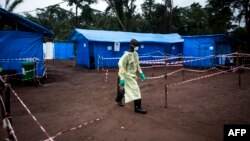Health officials in the Democratic Republic of Congo are racing to contain a new Ebola outbreak announced this week. At least two people are confirmed to have died of Ebola this month in a remote village of northwest DRC, very close to the border of the smaller, neighboring Republic of Congo.
The DRC's health minister, Dr. Oly Ilunga, has been keeping people updated on social media, tweeting that on Thursday -- some 24 hours after the initial announcement -- a team of 12 experts landed in Mbandaka, the city closest to the outbreak.
Ilunga said that Ebola had been confirmed in two of 17 hemorrhagic fever deaths seen in recent weeks in the northwest village of Bikoro. The area has reported 21 cases of hemorrhagic fever in all.
"Our country,” he said in an open letter to the Congolese population, “is facing a new epidemic of Ebola that is a public health emergency of international concern.”
The World Health Organization has released $1 million from its emergency fund to respond to this outbreak. WHO and medical aid group Doctors Without Borders are leading the response, and have sent experts to the site.
“MSF’s DRC emergency team is already on site and has been supporting the Ministry of Health to deploy a rapid and tailored response to the emergency since last Saturday,” the group, known by its french acronym MSF, said in a statement. “MSF will continue to adapt its response according to the needs on the ground.”
The aid group declined to give more details, saying its experts were still gathering information.
‘This is not the first time’
This is not Congo’s first encounter with the hemorrhagic fever, which causes an acute, serious illness which is often fatal if left untreated. It is transmitted to people from wild animals and can be spread through human-to-human transmission.
Ebola derives its name from the place it was first discovered, the Ebola River, a tributary of the Congo River, in 1976. The average survival rate is 50 percent, according to the WHO.
WHO spokesman Tarik Jasarevic told VOA this is Congo's ninth outbreak of Ebola since the virus was first identified, including one last year that he said "was contained relatively quickly."
"So we are hoping to do the same thing this time around -- to send quickly teams to the area where the virus has been confirmed to be circulating, to be in position to identify those who are sick, to be in position to identify those who have been potentially exposed, to put in place all those necessary measures that are used every time when there is an Ebola outbreak to try to stop the transmission as fast as possible," he said.
This latest outbreak has occurred in an area near the banks of the Congo River, just across the border from the Republic of Congo. Because this region is poor in infrastructure, its many waterways are vital for transport and trade activities.
Ebola killed more than 11,000 people in a two-year epidemic that ravaged Guinea, Sierra Leone and Liberia between 2014 and 2016. So far, none of the recent outbreaks in Congo have been connected to that event.
The WHO's Jasarevic said that to contain the newest outbreak, it is crucial that people in and around Bikoro cooperate with local health authorities.
"It is really important that communities in this particular area are engaged, are working together with authorities in terms of safe burial practices, in terms of proper contact tracing, to be compliant with those procedures," he said. "The community engagement has been proven as a key component in successful containment of an Ebola outbreak.”




